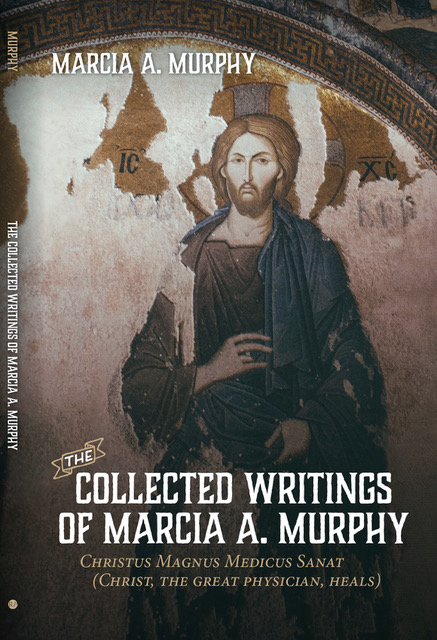From Wipf & Stock Publishers
Resource Publications March 2020
The Collected Writings
of
Marcia A. Murphy
Christus Magnus Medicus Sanat
(Christ, the Great Physician, Heals)
By Marcia A. Murphy
Purchase Here
Hers is a rare and powerful voice, one worth listening to.
Russell Noyes Jr., Emeritus Professor of Psychiatry, Carver College of Medicine, University of Iowa
Key Strengths of Book:
- Those who know persons with psychiatric disorders will gain appreciation of what recovery means and how it may be achieved.
- This is written by someone who has experienced mental illness who, therefore, can tell what the illness is like, providing insight for those who are ill or who provide care for people like herself.
- With the epidemic of opioid abuse and suicides by overdoses, this book offers much needed hope to those who are suffering or experience a lack of meaning in their lives.
Preface
During my early teen years, I developed a mental illness. Since then my life has taken many turns, some towards recovery. I have written about my experiences so that the lives of others who have a mental illness might be improved. I offer personal insights to stimulate new thought concerning the meaning in psychoses, forces of stigmatization, and how to find hope. My experiences and perspectives have implications not only for the psychiatrically disabled, but also for those who support the ill: their families, therapists, and physicians.
Covering a span of over twenty years these works stimulate new thought, albeit provocative at times, with the aim to reflect a view of the human being that has multiple dimensions which are not always accounted for in the science and practice of psychiatry. Psychiatry, for many years through fits and starts, has stumbled in its attempt to find cures and remedies for mental illness. Such attempts, though heroic in nature, have proven to be incomplete. Antipsychotics have helped patients a great deal but not without diverse, unpleasant, physical disorders resulting from side effects of these medications. Though the psychiatric drugs are all we have been able to offer from the mid-twentieth to early twenty-first century and they have provided some improvement to certain aspects of cognitive functioning and daily life, emotionally, many patients are still without hope and resort to substance abuse or even suicide. In this type of milieu, we need to ask ourselves: what else can be done to help the ill? It is my firm conviction that when patients hit rock bottom, they will soon discover the only way out is to look up—yes, up to the heavens; and there, in the source of hope and redemption, is God. We find that we cannot save ourselves.
So my work has had over the years as its purpose the aim to open doors of spirituality within the psychiatric community and, therefore, the scope of this book through the essays, articles, lectures, and creative nonfiction (story-telling) is to explain what I have learned over the course of my adult life. I do not claim total healing and recovery, nothing so grand as that. But maybe I can offer some insight. And it is through the delicate use of the written language which sits so quietly and passively on the page that I offer a glimpse into that often-sought-after world of faith, healing, and recovery. It quietly sits—waiting—for the reader to possess and to reflect upon. Christus Magnus Medicus Sanat: Christ, the great physician, heals.

